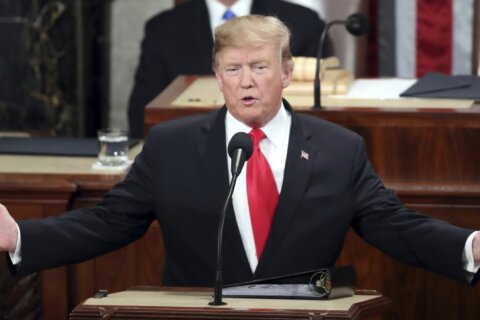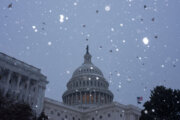The attacks of Sept. 11, 2001, were a dark time for all Americans, and for Muslims in the United States, there were more problems to come in the aftermath. But one American Muslim activist sees signs of hope.
“9/11 impacted Muslims in the same way it impacted everyone else in this country,” Edward Ahmed Mitchell, the deputy director of the Council on American-Islamic Relations, told WTOP.
“We are as American as everyone else. So we watched in horror as the towers fell, and we also stepped up to try to help the families and help those impacted [through] relief work and other activities.”
Muslim Americans “had an additional challenge to face,” though: an increase in hate crimes targeting them “sparked by the 9/11 attacks and our government’s response to it, as well.”
The numbers regarding those hate crimes aren’t what you might expect, Mitchell said.
“Most people would assume that the day after 9/11 was the worst day for American Muslims in this country in terms of anti-Muslim discrimination, anti-Muslim bigotry, anti-Muslim hate crimes,” he said. “But that’s actually not true.”
Through the initial pain of the attacks, Mitchell said, “We really saw that American Muslims and our neighbors were able to engage in interfaith dialogue, able to engage in relief work together.”
He added that then-President George W. Bush “went to a mosque right after 9/11 to say, ‘This attack did not represent Islam.’” Politicians, he added, “held back, and held a lid on top of anti-Muslim bigotry.”
- Echoes from 9/11 grow louder as future threats emerge
- The three men who guided millions of Americans through the day’s horrors
- US to review 9/11 records with eye toward making more public
- Teaching Sept. 11 as history: ‘We could do a better job’
- How events such as Sept. 11 have affected our collective mental health
- ‘I do remember the bodies’: DC-area firefighters reflect on 9/11, 20 years later
Mitchell said the highest number of Americans with negative opinions of Muslims in general — and the highest number of crimes of bias against them — didn’t come until about 2010 or 2011. “That’s when you really see negative opinions about Muslims really increased sharply,” Mitchell said.
Hate crimes followed along, according to the FBI’s numbers, increasing through 2016 “and up to close to the present day.” There was a dip in these crimes in 2020, but how much is attributable to the pandemic-related measures that kept many people at home all year isn’t known.
“But we are hopeful that things might be moving in the right direction,” Mitchell said, and he gave a few reasons.
For one thing, the kind of unity that prevailed immediately after the attacks is still around: “The interfaith dialogue, the community unity, that willingness to help people in need … I still think that exists in our country. I still think that is happening in response to other crises that occur,” Mitchell said.
For another, the post-Sept. 11 climate led more American Muslims to get involved: In the face of discrimination, “You also saw Muslims rise to meet those challenges,” Mitchell said. “We saw a new generation of Muslim lawyers and Muslim politicians and Muslim activists get engaged.”
And he looks to history.
“Many religious minorities in this country have gone through periods where they experienced hate and bigotry and state-sanctioned discrimination — the Jewish community, the Catholic community, the Mormon community and others,” Mitchell said.
“But we are confident that, like other communities before us, we will get over this hump.”
WTOP’s Melissa Howell contributed to this report.








